“Can you eat expired bread?” is a common question that arises when faced with a loaf past its expiration date. Understanding the implications of consuming expired bread is essential for making informed decisions about food safety.
In this comprehensive guide, we will delve into various aspects of expired bread, including how long bread is good for after the expiration date, the risks associated with eating expired bread, and what happens if you consume it. We will explore scenarios where bread is past its expiration date but shows no visible mold and discuss whether it is bad to eat expired bread.
Additionally, we will cover the recommended duration for consuming bread after the best-by date and the potential symptoms of eating expired bread. Furthermore, we will address the longevity of frozen bread after its expiration date and provide guidance on what to do if you accidentally consume expired bread. By the end of this article, you will have a comprehensive understanding of the topic and be better equipped to make informed decisions regarding expired bread consumption.
What are bread expiration dates?
Bread expiration dates serve as indicators of its freshness and quality. Two common terms used are “best by” and “expiration” dates. The “best by” date suggests that the bread is at its peak quality before this date but may still be consumed afterward. On the other hand, the “expiration” date signifies the last recommended date for consuming the bread.
Several factors can influence bread’s shelf life, including ingredients, preservatives, packaging, and storage conditions. For example, bread with added preservatives tends to last longer than those without. The presence of moisture, air exposure, and temperature fluctuations can also affect bread’s edibility.
Different types of bread have varying expiration periods. For instance, artisanal bread with fewer preservatives may have a shorter shelf life compared to commercially packaged sliced bread. Specialty breads like sourdough or whole grain breads might have a shorter expiration compared to white bread. It is crucial to understand the specific expiration guidelines for the type of bread you are consuming to ensure freshness and safety.
Can you eat expired bread?
Can you eat expired bread? Many people believe that consuming expired bread is inherently unsafe, but this is a common misconception. The expiration date serves as a guideline for optimal quality, not an exact point of spoilage. After the expiration date, bread may still be safe to eat depending on several factors.
To determine if expired bread is still edible, you should evaluate its quality. Look for signs of mold, unusual odors, or changes in texture. If the bread appears and smells normal, and there is no visible mold, it may still be suitable for consumption.
However, it’s essential to be aware of the potential risks associated with eating expired bread. The most common risk is food poisoning caused by harmful bacteria, such as Salmonella or E. coli, which can multiply in expired bread. Consuming such bacteria can lead to digestive issues, stomach cramps, and more severe complications in vulnerable individuals.
While the decision to eat expired bread ultimately rests with the individual, it is crucial to exercise caution and consider the potential risks involved. If there are any doubts about the bread’s safety or if you have a compromised immune system, it is best to err on the side of caution and avoid consuming expired bread.
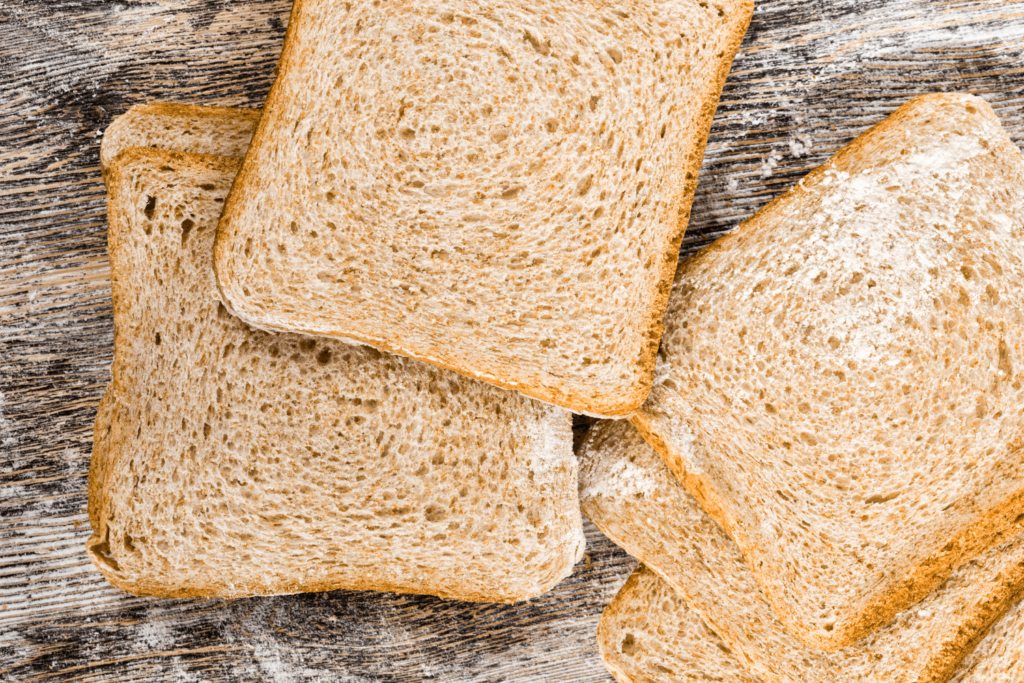
How long is bread good for after the expiration date?
After the expiration date, bread can still be good for consumption, but it depends on various factors. As a general estimation, bread is usually good for a few days to a week beyond its expiration date if stored properly.
Several factors can affect the shelf life of bread after the expiration date. These include the type of bread, ingredients, preservatives, and storage conditions. Bread with fewer preservatives or artisanal bread may have a shorter post-expiration life compared to commercially packaged bread.
To extend the edibility of bread beyond the expiration date, it is crucial to store it properly. Keep bread in a cool, dry place away from direct sunlight. Consider using a bread box, paper bag, or airtight container to maintain its freshness. Freezing bread can also prolong its shelf life significantly.
How long does freeze bread last after the expiration date?
Freezing bread can significantly extend its shelf life beyond the expiration date. When bread is properly frozen, it can remain safe to eat for several months.
Freezing slows down the staling process by inhibiting the growth of microorganisms and preserving the bread’s moisture content. However, it’s important to note that freezing may affect the texture of the bread slightly, making it slightly drier upon thawing.
How long can you eat bread after the best-by date?
The duration for which bread is safe to eat after the best-by date can vary. As a general guideline, bread is typically good for about 2 to 3 days after the best-by date if stored properly.
However, it’s important to consider various factors that can influence bread quality and safety post-best-by. These factors include the type of bread, ingredients, preservatives, storage conditions, and individual tolerance for consuming slightly stale bread.
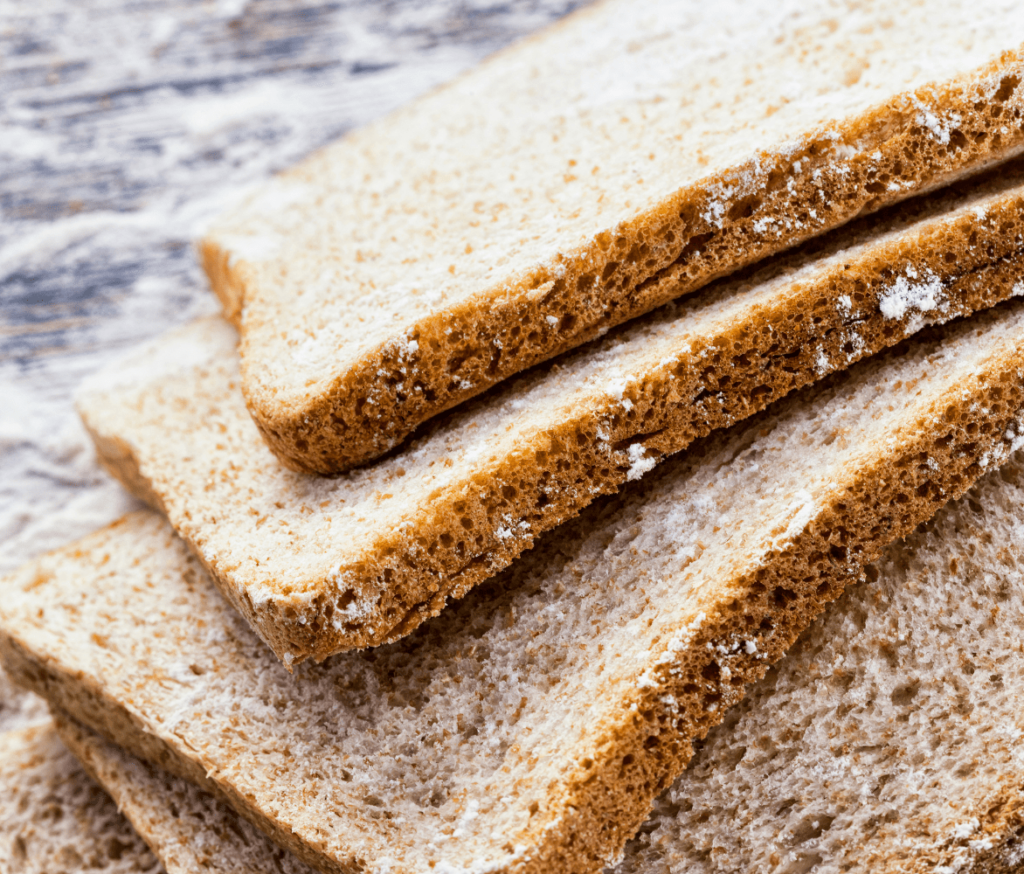
What are the signs of bread spoilage?
Signs of bread spoilage can vary depending on the specific type of bread and its condition. However, some common signs of bread spoilage include:
- Visible mold: Mold growth is a clear indication of bread spoilage. Look for fuzzy patches, green, blue, or black spots on the bread’s surface.
- Unusual odor: If the bread has a sour, musty, or off-putting smell, it may indicate spoilage. Fresh bread typically has a pleasant aroma.
- Texture changes: Spoiled bread may become excessively dry, sticky, or develop a slimy texture. It can also feel unusually hard or crumbly.
- Discoloration: Bread that exhibits significant discoloration, such as dark spots or an overall change in color, may be a sign of spoilage.
- Stale taste: If the bread tastes noticeably stale, has an off flavor, or lacks the usual freshness, it could indicate spoilage.
- Pest infestation: Presence of insects or other pests in or around the bread is a clear sign of spoilage and contamination.
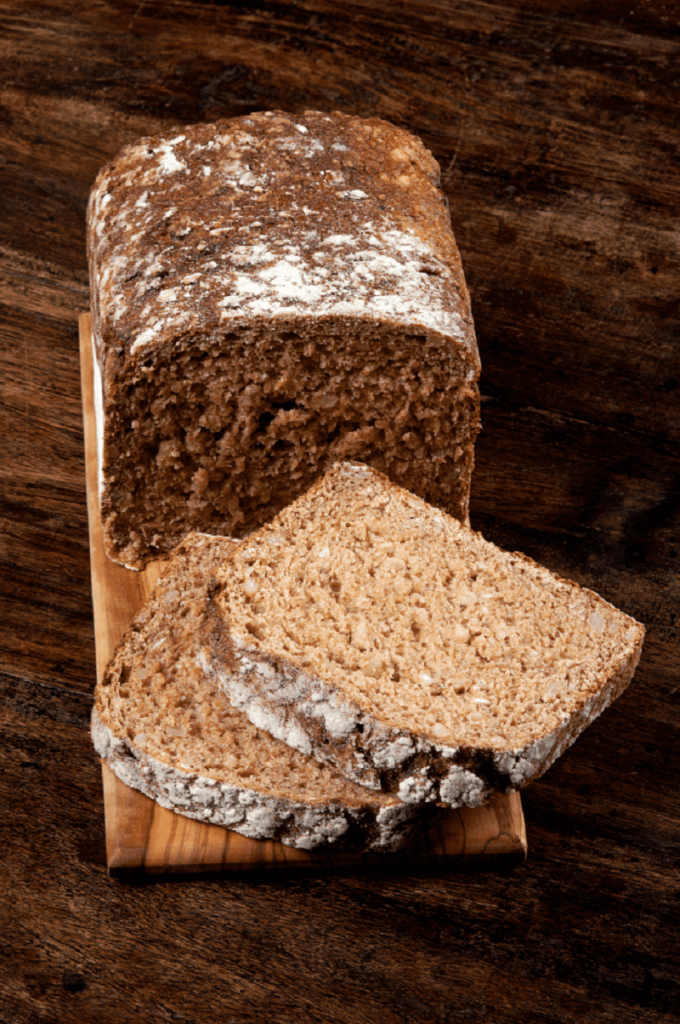
Is it bad to eat expired bread?
Eating expired bread is not necessarily “bad,” but it carries some potential risks. The expiration date on bread is an indicator of its optimal quality and freshness, rather than an instant spoilage point. While some people may consume expired bread without experiencing any issues, it’s essential to be aware of the potential risks involved.
Expired bread can harbor harmful bacteria, such as Salmonella or E. coli, which can multiply over time. Consuming bread contaminated with these bacteria can lead to food poisoning and related symptoms like nausea, vomiting, diarrhea, and abdominal pain. Individuals with compromised immune systems are particularly susceptible to these risks.
To make an informed decision about consuming expired bread, consider evaluating its quality. Look for visible signs of mold, unusual odors, or changes in texture. If the bread appears and smells normal, and there is no visible mold, it may still be safe to eat. However, it’s crucial to be cautious and consider the potential risks before consuming expired bread.
If there are any doubts about the bread’s safety or if you have a compromised immune system, it’s recommended to discard expired bread to minimize the risk of foodborne illnesses.
What happens if you eat expired bread?
Eating expired bread symptoms and risks. While the severity and type of symptoms may vary from person to person, here are some common effects associated with consuming expired bread:
Digestive issue
Eating expired bread can cause digestive problems such as stomach discomfort, bloating, gas, and diarrhea. These symptoms may arise due to the presence of harmful bacteria or changes in the bread’s composition over time.
Food poisoning
Expired bread can harbor harmful bacteria like Salmonella or E. coli, which can multiply and cause food poisoning. Symptoms may include nausea, vomiting, abdominal cramps, and fever. People with weakened immune systems are particularly vulnerable to foodborne illnesses.
Allergic reactions
In some cases, expired bread may trigger allergic reactions in individuals who are sensitive or allergic to certain ingredients like gluten, wheat, or other additives. Symptoms can range from mild itching and hives to more severe reactions like difficulty breathing or anaphylaxis.
Mold exposure
If expired bread has visible mold growth, consuming it can lead to mold exposure. Inhaling or ingesting mold spores can cause respiratory issues, allergic reactions, and potential complications in individuals with existing respiratory conditions.
It’s important to note that the specific symptoms and risks may vary depending on factors such as the individual’s health, the type of bread, and the extent of expiration. If you experience any adverse effects after consuming expired bread, it’s advisable to seek medical attention, especially if symptoms are severe or persistent.
Can I eat bread after the expiration date if there’s no mold?
When bread is past its expiration date but shows no visible mold, it raises questions about its safety and edibility. Understanding the relationship between mold and expiration is crucial in such situations.
Mold growth is typically an indicator of bread spoilage, but it may not always be visible immediately after the expiration date. Even in the absence of mold, there are potential risks and considerations to keep in mind when consuming expired bread.
Factors such as storage conditions, preservatives, and the type of bread can affect its shelf life and safety. Bread without mold may still harbor bacteria or other microorganisms that can cause foodborne illnesses if they have multiplied to harmful levels.
To determine if bread is safe to eat without visible mold, consider the following:
- Smell and texture: Assess the bread’s odor and texture. If it smells unusual, has an off-putting odor, or feels excessively dry or sticky, it may be an indication of spoilage and should be discarded.
- Taste a small portion: Take a small bite to assess the taste. If the flavor is significantly altered, unpleasant, or has a sour taste, it’s best to avoid consuming it.
- Individual health considerations: People with compromised immune systems or specific health conditions should exercise extra caution and consult a healthcare professional before consuming expired bread.
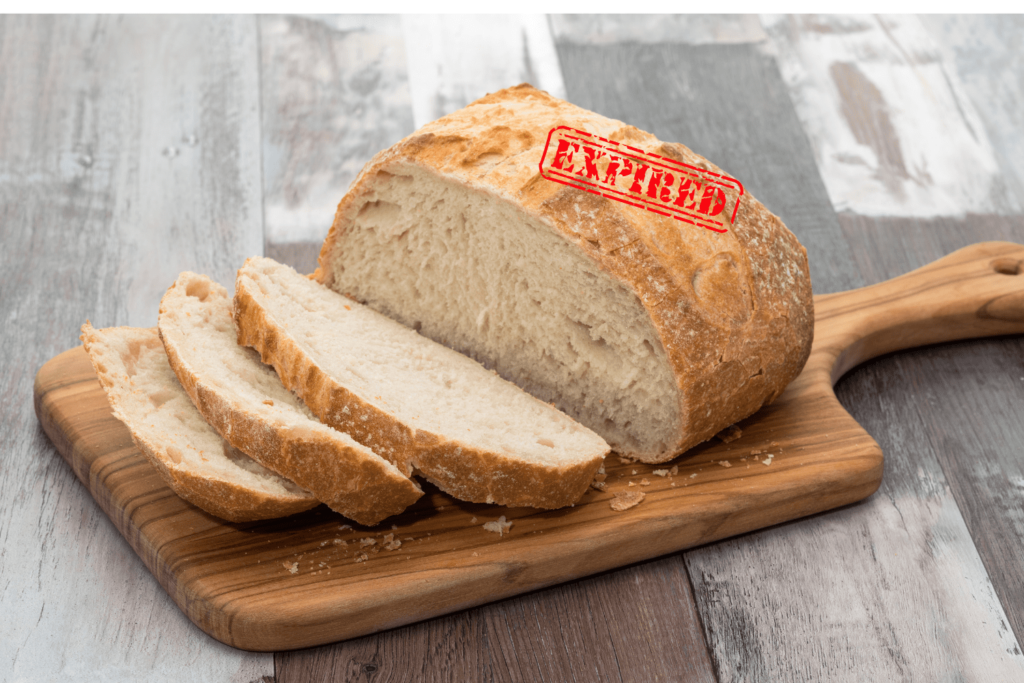
How many days after expiration can you eat bread?
The number of days you can safely eat bread after its expiration date can vary depending on various factors. As a general guideline, it is recommended to consume bread within 2 to 3 days after the expiration date, if stored properly.
Several factors influence the post-expiration edibility of bread, including the type of bread, ingredients, preservatives, storage conditions, and individual tolerance for consuming slightly stale bread.
What to do if you eat expired bread?
If you have consumed expired bread, here are the steps to take:
Monitor your health
Pay attention to any unusual symptoms or discomfort that may arise after consuming expired bread. Common symptoms include digestive issues, nausea, vomiting, diarrhea, or allergic reactions.
Stay hydrated
Drink plenty of water to stay hydrated and help flush out any potential toxins or bacteria that may be present in the expired bread.
Observe food poisoning symptoms
If you experience severe symptoms such as persistent vomiting, high fever, severe abdominal pain, or signs of dehydration, it is important to seek immediate medical attention.
Contact a healthcare professional
If you have any concerns or experience persistent symptoms, it is advisable to consult a healthcare professional. They can provide proper guidance and advice based on your specific situation.
Contact poison control
If you suspect that the expired bread may have caused significant harm or if you are unsure about the potential risks, contact your local poison control center for assistance and guidance.
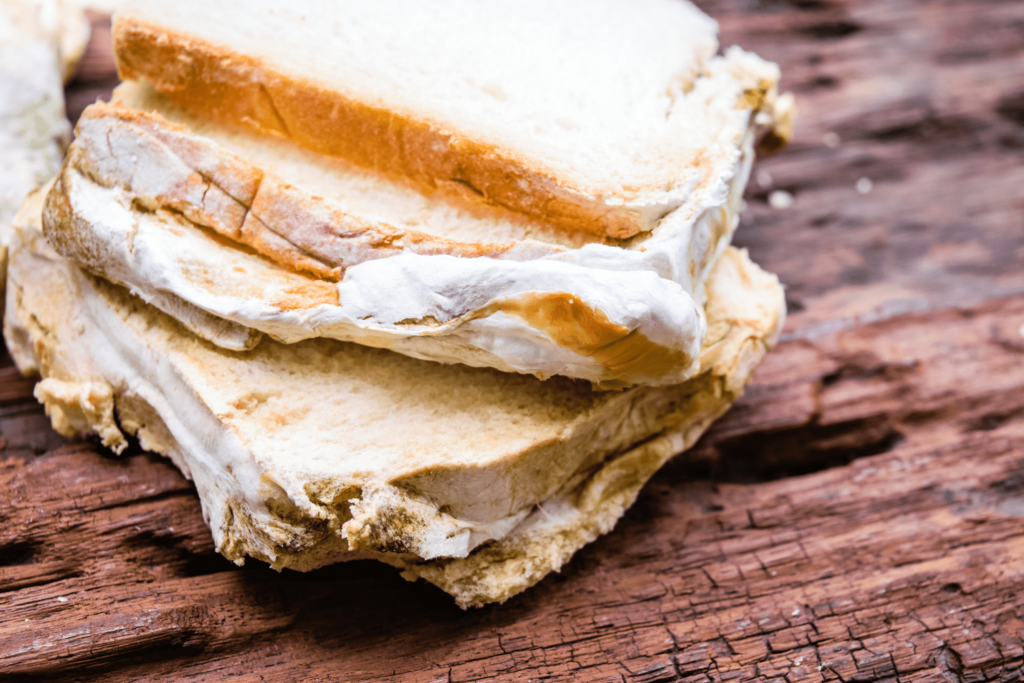
How can I prevent bread from spoiling before the expiration date?
To prevent bread from spoiling before the expiration date, you can follow these tips:
- Proper storage: Store bread in a cool, dry place, away from direct sunlight and moisture. Avoid storing it near the stove, dishwasher, or other appliances that generate heat or steam.
- Use airtight containers or bags: Transfer bread to airtight containers or resealable plastic bags to maintain its freshness and protect it from exposure to air and humidity.
- Avoid refrigeration: Refrigeration can accelerate the staling process and make bread go stale faster. It is generally recommended to keep bread at room temperature unless it is highly humid or you live in a hot climate.
- Freeze excess bread: If you have more bread than you can consume before the expiration date, consider freezing it. Slice the bread, place it in a freezer bag, and store it in the freezer. Thaw individual slices as needed.
- Separate from strong-smelling foods: Keep bread away from strong-smelling foods like onions, garlic, or spices, as bread can absorb odors easily.
- Avoid touching bread with bare hands: When handling bread, use clean utensils or food-safe gloves to prevent transferring bacteria or contaminants onto the bread.
- Purchase smaller quantities: If you find that bread frequently spoils before you can finish it, consider buying smaller loaves or packages to ensure you consume it within the recommended timeframe.
FAQs
What happens if I eat expired bread regularly?
Eating expired bread regularly can pose potential risks to your health. Consuming expired bread increases the likelihood of ingesting harmful bacteria, which can lead to food poisoning or other digestive issues.
Over time, regular consumption of expired bread may contribute to a higher risk of experiencing these adverse effects. It is important to prioritize food safety and avoid making a habit of consuming expired bread.
Can toasting expired bread make it safe to eat?
Toasting expired bread does not make it safe to eat. While toasting may help improve the taste and texture, it does not eliminate potential harmful bacteria or other contaminants that could be present in expired bread.
Toasting does not reverse the spoilage process or remove any toxins that may have developed. Therefore, it is recommended to exercise caution and avoid consuming expired bread, even if it has been toasted. Opting for fresh bread or properly stored bread within its shelf life is the best way to ensure food safety and enjoy a healthy eating experience.
How can you tell if bread is still good to eat after the expiration date?
To determine if bread is still good to eat after the expiration date, consider the following:
- Visual inspection: Check for any signs of mold growth on the bread. If there is visible mold, it is best to discard the bread.
- Odor assessment: Smell the bread for any unusual or off-putting odors. If it has a sour or unpleasant smell, it may indicate spoilage.
- Texture examination: Assess the bread’s texture. If it feels excessively dry, sticky, or has a significant change in texture, it may no longer be suitable for consumption.
- Taste test: Take a small bite of the bread to evaluate its taste. If it tastes significantly different, off, or stale, it is best to avoid consuming it.
Does expired bread lose its nutritional value?
Regarding the nutritional value of expired bread, while the expiration date primarily indicates optimal freshness and quality, the nutritional value of bread typically does not change significantly after the expiration date. However, over time, the bread’s quality may deteriorate, potentially affecting its taste, texture, and overall appeal.
It’s worth noting that the nutritional content of bread primarily depends on the ingredients used and the specific type of bread. While expired bread may not be as enjoyable or appetizing, it generally retains most of its original nutritional value unless there are visible signs of spoilage or mold growth. However, for the best nutritional value, it is recommended to consume bread within its shelf life, prior to the expiration date.
How does the type of bread affect its edibility after the expiration date?
The type of bread can have an impact on its edibility after the expiration date. Different types of bread, such as white bread, whole wheat bread, sourdough bread, or artisanal bread, have varying compositions and moisture levels, which can affect their shelf life and how they fare after the expiration date.
Breads with more preservatives and additives, such as commercially packaged sliced bread, tend to have a longer post-expiration edibility period. These breads may still be safe to eat for a few days after the expiration date if stored properly.
On the other hand, breads with fewer preservatives or specialty breads, like artisanal bread, may have a shorter post-expiration edibility period. These breads tend to have a higher moisture content, making them more prone to mold growth and quicker spoilage.
Does expired bread always have visible mold?
Regarding visible mold, it is not always present on expired bread. Mold growth depends on various factors, including storage conditions, moisture content, and the specific type of bread.
While some expired bread may develop visible mold, other bread may not show any signs of mold growth, but it could still be spoiled or harbor harmful bacteria. Therefore, it is crucial to assess the bread’s quality based on factors such as smell, texture, and taste, even if there is no visible mold present.
Does expired bread have a higher risk of contamination?
Expired bread does have a higher risk of contamination compared to fresh bread. As bread ages, its moisture content and nutrient composition can create an environment conducive to bacterial growth.
Harmful bacteria like Salmonella or E. coli may multiply to dangerous levels, increasing the risk of foodborne illnesses if consumed. Therefore, consuming expired bread carries a higher likelihood of contamination.
Can you eat gluten-free bread after the expiration date?
As for gluten-free bread, the same general guidelines apply. Gluten-free bread, like any other bread, can potentially spoil after the expiration date. It is important to check for signs of mold, unusual odors, changes in texture, and other indicators of spoilage. Gluten-free breads, which are often made with alternative flours and ingredients, may have different characteristics and spoilage patterns compared to regular bread.
Therefore, it is crucial to evaluate the quality of gluten-free bread and exercise caution when consuming it after the expiration date. When in doubt, it is advisable to discard expired gluten-free bread to minimize the risk of consuming spoiled or contaminated food.
Does toasting bread kill bacteria that may have developed?
Toasting bread can help reduce the presence of bacteria, but it may not completely eliminate all bacteria that have developed. While toasting bread can cause heat to penetrate the surface, it may not reach the inner portions of the bread where bacteria could potentially reside. Therefore, while toasting can improve the taste and texture of bread, it is not a foolproof method for eliminating all bacteria that may have developed.
Can you eat bread that has an off-putting smell after the expiration date?
As for bread that has an off-putting smell after the expiration date, it is generally advisable to exercise caution and avoid consuming it. An unusual or unpleasant odor can be an indication of spoilage, indicating the potential presence of harmful bacteria or other contaminants.
While visual inspection and odor assessment are not foolproof methods, a strong off-putting smell is often a warning sign of spoilage. It is best to prioritize food safety and discard bread with off-putting smells to avoid potential risks to your health.
Can you eat bread that has been vacuum-sealed past the expiration date?
Eating bread that has been vacuum-sealed past the expiration date depends on several factors. Vacuum-sealing can help prolong the freshness of bread by removing air and reducing the potential for mold growth. However, it does not guarantee the safety or edibility of bread indefinitely.
While vacuum-sealed bread may maintain its quality for a longer period, it is essential to consider other factors such as storage conditions, ingredients, and the type of bread. Over time, even vacuum-sealed bread can experience changes in taste, texture, and overall quality.
To determine if vacuum-sealed bread is still good to eat after the expiration date, it is important to conduct a visual inspection, assess the odor, and evaluate the texture. If there are signs of mold growth, an off-putting smell, or significant changes in texture, it is best to discard the bread.
Conclusion
Finally, the question “Can you eat expired bread?” requires careful consideration. While consuming expired bread may not always lead to immediate harm, it is essential to be aware of the potential risks involved. The expiration date on bread serves as a guideline for optimal quality, and factors such as mold growth, changes in texture, and the presence of harmful bacteria can impact its safety.
Evaluating the bread’s quality, including the absence of mold and unusual odors, is crucial in determining its edibility. However, it is recommended to exercise caution, especially for individuals with compromised immune systems.
If there are any doubts or concerns about the bread’s safety, it is best to err on the side of caution and avoid consuming expired bread. Prioritizing food safety and considering individual health factors are key in making informed decisions regarding expired bread consumption.